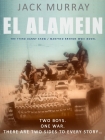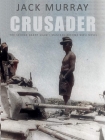El Alamein, Jack Murray [best autobiographies to read .txt] 📗

- Author: Jack Murray
Book online «El Alamein, Jack Murray [best autobiographies to read .txt] 📗». Author Jack Murray
Manfred helped the still helpless Gerhardt to his feet. His laughter stopped suddenly. The two boys paused for a moment and looked overhead. There was a lone airplane. It took a moment or two to register that it was one of theirs.
‘I wonder what’s wrong?’ said Manfred.
By now most of the players and spectators were looking up at the sky. The plane began its descent. Landing gear and flaps became extended. After a few minutes, engine turning over more slowly, the plane landed on the pitch, much to the amusement of all the onlookers who began to flock towards it.
A familiar figure emerged from the cockpit. A smile erupted over the sweat-stained face of Hans-Joachim Marseille. His newly awarded Iron Cross glinted in the early afternoon sunlight. However, there was no mistaking how haggard he looked. It was clear he’d had a busy day. The bullet holes in his fuselage confirmed this.
He was helped down from the plane and all but carried to a hospital tent. This was the first time that either Manfred or Gerhardt had seen the famous air ace up close. Both felt a stab of guilt. While they had been enjoying the football, many of the Luftwaffe were flying sorties and patrolling the skies against the ongoing aggression from the RAF.
‘He looks done in,’ commented Gerhardt.
‘What’s he saying?’ asked Manfred as there was too much hubbub to hear what was being said.
Finally the word came back. Two more kills. Cheers went up all around the flyer. When they subsided, both Manfred and Gerhardt heard him ask, ‘Who won the match?’
-
The first hint of spring was in the air and flowering on the ground. There were wisps of colour in the unremitting sand and rock. In early March and April the desert was almost bearable. Since the end of February, life had transformed itself. No more marches. Better still, there was no more fighting. They were to stay in one place for the foreseeable future. The repairs taking place now were for more than just armour and machinery. The Afrika Korps was, at last, having a long overdue rest. The enemy, apparently, were mostly of a like mind. Only the RAF seemed intent on poking the wasp’s nest.
There was renewed energy in everyone. The camp at Tmimi was humming with new arrivals, both men and machines. Manfred was now one of the more experienced crewmen in the regiment. He had a new tank commanded by an old face. Lieutenant Basler had, as usual, been handed a few rookies. In return he’d requested an experienced crew member. He wanted Manfred. Kummel, reluctantly, released Manfred to join the lieutenant.
Moving from the captain’s tank proved not to be a step down. He was to become a gunner. Manfred’s experience of two battles was always likely to be too important to waste as a loader. In tank terms, the move to be a gunner was a promotion if not in rank then in profile. It was recognition that he had performed well in the past few months and could be trusted with more advanced responsibilities. Unfortunately, it meant that he would be leaving Hans Kummel’s tank. This was a pity as he not only liked the captain he’d learned a great deal from him. More importantly, he viewed Kummel as lucky. This was something all of the soldiers understood but rarely spoke of.
Aside from Basler, his new crew consisted of one veteran driver, Klaus Jentz, and two newly arrived men, Thomas Keil, who would operate the wireless, and Gerd Kleff who would be Manfred’s loader. Both were from Bavaria but could not have been more different from Manfred’s old crew mate, Andreas Fischer. Manfred looked at them both on his first day in the new tank and wondered how he must have seemed to Overath and Kastner, the senior men in his first tank. Back then he’d tried to hide his nervousness, not through the swagger that Fischer used, successfully he realised, but through a combination of seriousness and competence.
The two young men, and they were both younger than Manfred, seemed more like puppies: a combination of eagerness to please and enthusiasm. They used this to mask the fear they were feeling. Manfred felt some sympathy for their plight yet was happy to leave them to it. He couldn’t be their nursemaid. If anything, this would be counter-productive. This was the army. They were in a war. They would have to figure it out for themselves. Only three things were needed from the two boys. A willingness to learn; a willingness to obey and, unspoken, a willingness to march towards death.
There was also a return. Manfred awoke one morning courtesy of a cup of cold water poured liberally over his head. Just as he was about to lay into the culprit he saw who it was. Fischer beamed down at him seemingly none the worse for his wounds.
‘You’re back,’ exclaimed Manfred, leaping to his feet. He stopped himself for a moment before adding, ‘Holiday over, then?’
Fischer grinned and replied, ‘Alas, yes. I don’t know who was sadder. Me or the nurses.’
Some things clearly hadn’t changed. Fischer’s ego had avoided any long-term damage from his brush with death. If anything, the scar tissue only added another layer of thickness to his skin. What, several months ago, Manfred would have found irritating, he now enjoyed immensely. Adding to this peculiar pleasure was seeing the impact that a fully-recovered and unconstrained Fischer had on some of the new recruits. However, Manfred’s implied promotion had one other benefit that only occurred to him as he chatted with his friend.
‘So you’ll be loading then,





Comments (0)